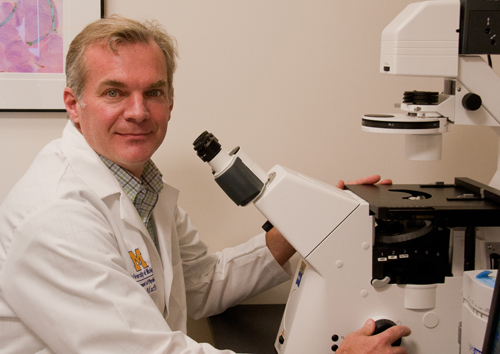
Building a better mouse may provide insight into one of the world’s biggest human health epidemics: obesity. A team of researchers at the University of Michigan Medical School, led by Prof. Ormond MacDougald, B.Sc. (Agr.) ’86, have developed genetically-engineered mice that are resistant to obesity and its associated health problems.
According to the Canadian Health Measures Survey, 24 per cent of adults in Canada were obese from 2007 to 2009. “Obesity is a worldwide problem,” says MacDougald. “The complications associated with obesity decrease the quality of life for millions, and at some point soon, it will be billions of people. I would be thrilled to make a small contribution to our understanding of the underlying scientific foundation.”
MacDougald’s contribution could have big implications for obesity. Maintaining a healthy weight could be as easy as popping a pill that blocks the formation of fat cells, regardless of what you eat and how much (or how little) you exercise.
“We see obesity now because of our lifestyle,” he says. “We have basically unlimited access to energy-dense foods and many of us have the luxury of living sedentary lifestyles.”
The genetically-altered mice in MacDougald’s lab eat as much high-fat food as they want without packing on the grams or spending hours on an exercise wheel. In fact, they have 50 per cent less body fat than regular mice on a high-fat diet that engage in the same level of physical activity. Sound too good to be true? It gets even better. Not only do the transgenic mice stay slim, they don’t suffer from obesity-related diseases like diabetes and their high bone mass makes them resistant to osteoporosis.
MacDougald’s lab is trying to understand the molecular processes behind the cellular signaling that determines whether mesenchymal stem cells develop into adipocytes (fat cells), osteoblasts (bone cells) or myocytes (muscle cells). Disrupting the signaling in vitro turns the stem cells into fat cells while activating the signaling blocks this process and stimulates the growth of osteoblasts.
“We made a transgenic mouse that forced the expression of Wnt10b [a signaling protein that inhibits fat cell formation] within adipose tissue and created a mouse that is lean and resistant to genetic obesity, diet-induced obesity and has a much improved metabolic profile in terms of insulin sensitivity and glucose homeostasis,” says MacDougald.
So what does this mean for humans? Could a bone-strengthening, fat-fighting pill be just around the corner?
“Pharmaceutical companies have pursued small molecules and other approaches with the hopes of targeting this pathway to increase bone mass and they would be very happy if the side effect of their drug was a healthy decreasing of adipose tissue formation,” says MacDougald.
As the youngest of five children, four of whom attended U of G, MacDougald grew up on a pig farm near Fullarton, Ont., which turned out to be the perfect upbringing for an obesity researcher. Being surrounded by portly pigs sparked his interest in how the body stores fat.
“Growing up on a pig farm, we were always sensitive to the adiposity of our pigs because we were paid based upon the amount of back fat they had,” he says. “Less back fat meant more money. I always had an interest in lipid accumulation because of that and then when I switched my focus from agricultural research to research that was more applied to humans, that interest went with me.”
MacDougald began his studies at Guelph as an animal science major, and his mentors included Prof. Rob Etches, chair of animal and poultry science at the time. He went on to receive a master’s degree and PhD at Michigan State University. After his postdoctoral fellowship at Johns Hopkins University School of Medicine, he joined the faculty of the University of Michigan Medical School. He is the recipient of the John A. Faulkner Collegiate Professorship in Physiology and the Rackham Award for Graduate Mentoring.
In addition to attending the Nobel Symposium in 2007, MacDougald recently gave talks in China and Korea. He will speak at the Benzon Symposium on Adipose Tissue in Health and Disease in Copenhagen. The international conference will be held from Aug. 27 to 30. He lives in Ann Arbor, MI, with his wife and four children.